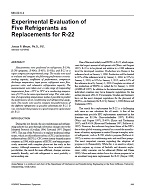Covers the various types of heating systems available for commercial and residential buildings and three basic components of every heating system: the fuel source, the energy conversion plant, and the energy distribution system. Topics include: basic selection criteria for any heating system; factors that must be considered when designing a commercial heating system; various types of commercial heating systems that may be used; basic types and design criteria of industrial and residential heating systems; how to calculate heating costs; relevant codes and standards that affect heating systems; and commissioning and maintenance of heating systems.
What You Will Learn:You will develop an understanding of the various types of heating systems available for commercial and residential buildings and the three basic components of every heating system: the fuel source; the energy conversion plant; and the energy distribution system. After completing the course, you should have an understanding of:
- The basic selection criteria for any heating system.
- The factors that must be considered when designing a commercial heating system.
- The various types of commercial heating systems that may be used.
- The basic types and design criteria of industrial heating systems.
- The basic types and design criteria of residential heating systems.
- How to calculate heating costs.
- The relevant codes and standards that affect heating systems.
- Commissioning and maintenance of heating systems.
Course Content
- Introduction – Course overview and terminology.
- Overview of Heating Systems – Basic heating system components, fuel source, energy conversion plant, and energy distribution system.
- Basic Selection Criteria – Basic selection criteria, occupancy and comfort considerations, thermal envelope, ventilation requirements, regional preferences, and availability of fuels.
- Commercial Heating Systems – Commercial building types, central multizone systems, and forced air furnaces and unitary heating systems.
- Industrial Heating Systems – Basic system considerations, district heating and cooling, waste heat recovery, and high temperature water and steam systems.
- Residential Heating Systems – System types, single-family systems, multifamily systems and cooling towers.
- Heating Cost Calculations – Energy estimation methods, installation costs, operating and maintenance costs, simple payback calculations, and lifecycle cost calculations.
- Codes and Standards – What are codes and standards, safety codes and standards, performance standards, and code- and standards-writing organizations.
- Building Commissioning and Maintenance – Heating system design summary, commissioning of heating systems, and maintenance requirements.
Who Should Enroll in This Course?
This is an excellent course for anyone who needs a general overview of heating systems. You will benefit from this course if you are:
- A recent engineering graduate working in the HVAC&R industry.
- An experienced engineer who has entered the HVAC&R field from another engineering area.
- An architect, technician, construction or building management professional who wants to increase your knowledge of HVAC systems.
Participants completing this course earn 3.5 Continuing Education Units (CEUs) or 35 Professional Development Hours (PDHs).
Product Details
- Published:
- 2000
- Number of Pages:
- 403
- File Size:
- 1 file , 9.3 MB
- Product Code(s):
- D-98039


